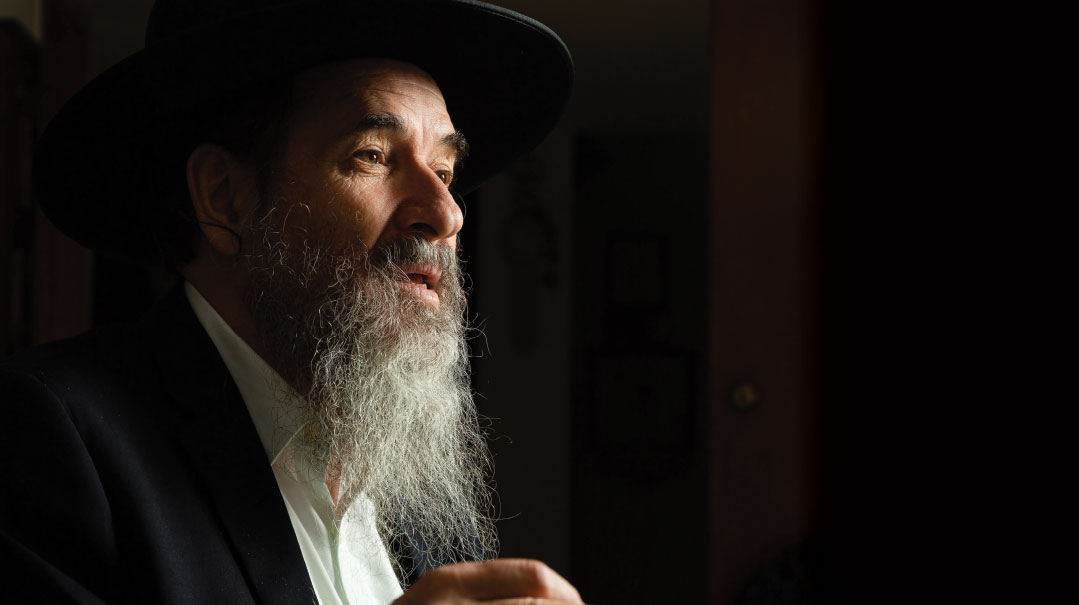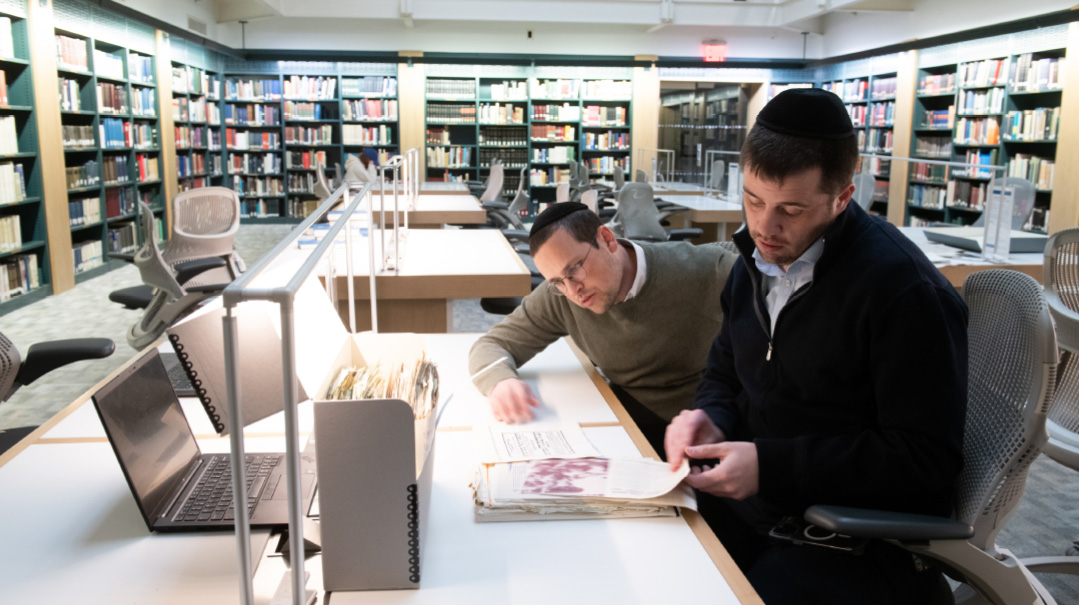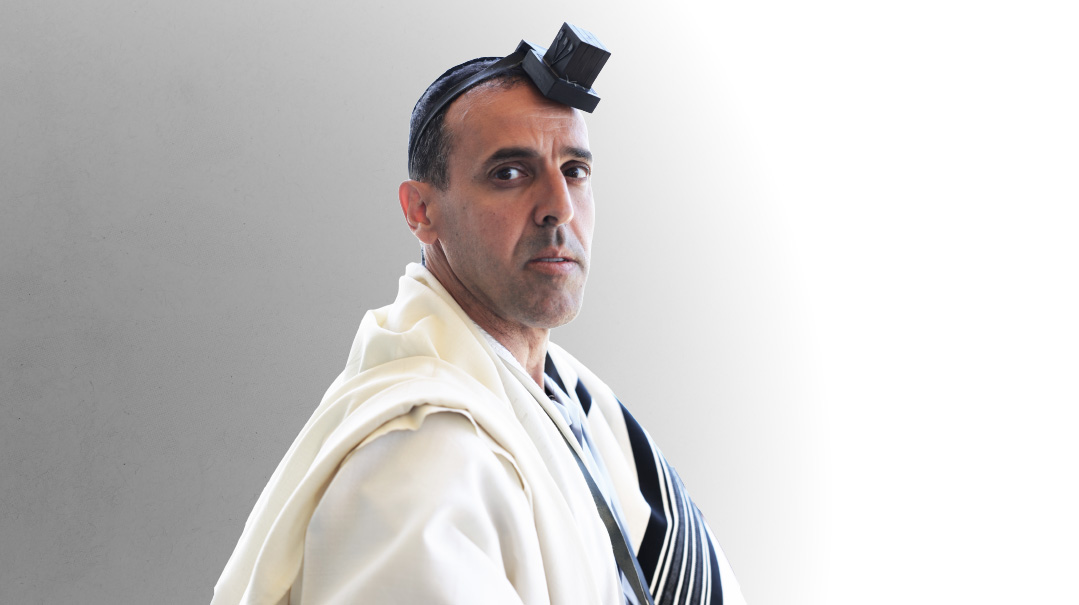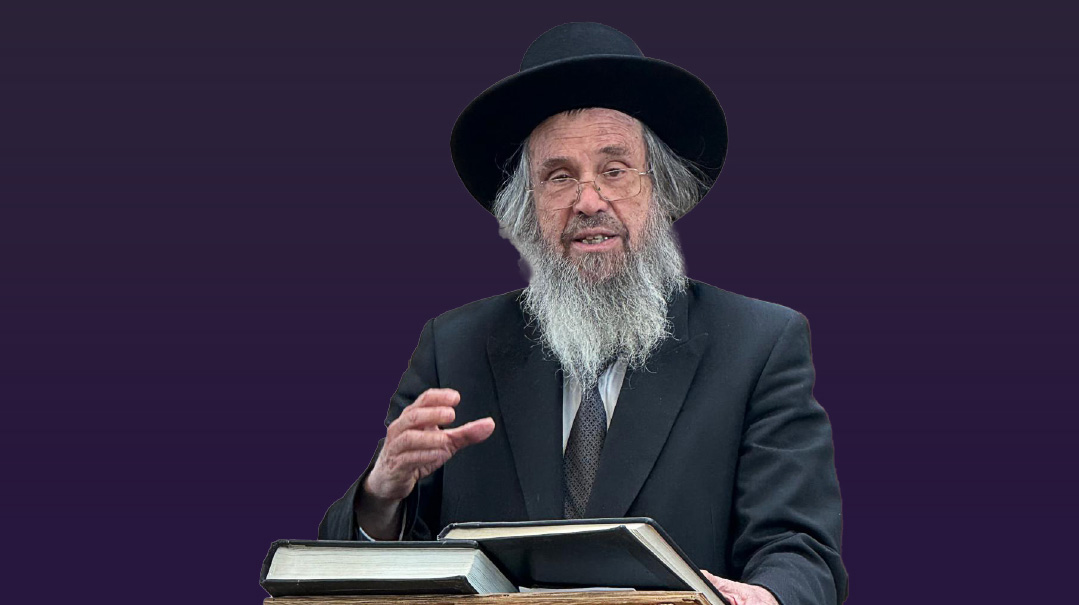Mona’s Year of Highs and Lows

"Oy v’avoy if we don’t change from corona. I thank Hashem because He cleaned me and I came out as a new person”

If Mona Rosenblum composed Italian opera instead of Jewish masterpieces, the musical version of his own dramatic last few months would test the most skillful tenor.
February 2020 found the legendary arranger and composer from Bnei Brak on a whirlwind tour of Tel Aviv, London, and New York for a series of dazzling performances in honor of Dirshu’s Siyum HaShas. Roshei yeshivah, chassidic rebbes, and tens of thousands of others focused on his diminutive form and dancing baton as he conducted dozens of instruments and singers through a masterpiece that he’d labored over for two years.
A month later, nobody would get near him.
As the first wave of coronavirus hit Bnei Brak just after Purim, elevated temperature and breathing difficulties sent him to the hospital, into a world of panicked doctors and gasping patients. “The staff was so scared that they wouldn’t take my ID. I was told to walk on my own to an isolated ward, where a disembodied voice directed me to ‘turn right, then left… don’t touch the button!’” he says. “I’ll never forget bed number 13. I felt so alone. I said Shema and Vidui — I felt that I was finished.”
Sitting with his back to the baby grand piano in his spacious Bnei Brak apartment, Mona (Moishe Mordechai) Rosenblum sums it up with an understatement: “It’s been a year of ups and downs.”
Although shaken by his encounter with illness, that “down” didn’t last long. Far from home, and recovering in a corona hotel together with the mix of Jews only a pandemic could have thrown together, Mona’s music — on a borrowed accordion — worked its magic. The shaky smartphone video that emerged shows a white-bearded Yerushalmi nodding along to the Israeli hit “Mi Shemaamin Lo Mefached,” alongside a stocky type getting carried away with “Oooo ayayayay.” There was a message along with the music: “I said to them, ‘Oy v’avoy if we don’t change from corona. I thank Hashem because He cleaned me and I came out as a new person.’ ”
As ever, this man, whose first language seems to be music, has translated his journey into a tune. If the majesty of the Siyum HaShas found expression in a 50-piece symphony performance, his fear and faith led him in a different direction. Drumming on the tabletop, his eyes closed, he hums a folksy tune that he’s just composed: “Eis Tzarah hi LeYaakov,” meaning the suffering of the Jewish people — “umimenah yivasheiah,” he concludes triumphantly, alluding to the eventual salvation.
And glancing up at the large portrait on the wall, this classically trained musician who grew up singing Gerrer marches in postwar Ramat Gan explains what drives his unending creativity, and our generation’s thirst for music.
“The Nadvorna Rebbe once told me, ‘Today we have no Beis Hamikdash and no korbanos, but there’s one thing that remains from then: song. It’s an avodah to sing for Hashem.’ ”
A Long Year
Music, it turns out, isn’t the only form of notes that Mona Rosenblum reads. Opening his meticulously handwritten corona diary, he declaims, “For me, 2020 started in 2018.”
He pauses with a trademark gleam in his eye, savoring the effect of a good sound bite, and then explains.
“When Dirshu Director Shlomo Rosenstein came to me back then and said, ‘We’re planning a Daf Yomi siyum for 2020 and we want you to compose something special,’ it felt strange to think so far ahead, but in the end the work took nearly two years.”
Something special they asked for, and something special they got. The 13-minute-long composition, named “Beheiasef Roshei Am,” was based on the words of the Imrei Emes to the Knessiah Gedolah in Vienna in 1923, calling for the establishment of the daf yomi.
The monumental composition that Mona produced was a product of both inspiration and perspiration. “I started with the words, and then opened my records and found a fragment of a tune and saw that it fitted the section ‘Vayehi B’Yeshurun Melech.’ Each day I added something to the piece, and then I sat with singer Zanvil Weinberger who understands music, and he advised me to add a chazzanus segment. So we built it in modules, like an opera.”
With elements of classical music giving way to hints of a Gerrer march, followed by sections of chazzanus, then heavy use of the sax and trombone, ending with a typically chassidic chorus, there’s no way to understand the complex piece without reference to Mona’s multihued musical background.
“I was raised in Ramat Gan by parents who were both Gerrer chassidim and Holocaust survivors from Poland, and so the music of the local shtibel was my first influence. Most people there weren’t full-fledged chassidim anymore, but we sang the niggunim of legendary Gerrer composer Yankel Talmud.”
“In Gur,” Mona continues, referring to the chassidic group by the name mostly used in Israel, “they don’t compose with words — the tune is in the center. Talmud understood that music is like a speech: It needs to have an introduction, then ask questions, then have a punch line. He was a master at doing that.
“Once I did a record with Dan Gottfried, one of Israel’s leading pianists. We did all different types of tunes, many of which I’d composed, but when I got to a Yankel Talmud song, he suddenly stopped and asked, ‘Who composed this?’ I asked him why, and he said, ‘Because this is good.’ I said to him, ‘What’s wrong with mine?’ But although he’s secular and unconnected to the music, he could appreciate Talmud’s composition because it didn’t rely on matching any words.”
If Mona’s appreciation for musical storytelling began with the marches and waltzes of Ger, it was deepened by a long stint in Tel Aviv University’s school of music, and subsequent decades heading the IDF Chief Rabbinate’s choir. His journey from the dati-leumi world to the heart of Bnei Brak years ago was facilitated by his connections to the many chassidic dynasties, including Belz and Chabad, for whom he arranged music.
But while all of these are influences, his music emanates from deep within.
“I have two types of compositions,” says Mona thoughtfully. “Sometimes, I sit down and try to compose — my wife and children are my best critics,” he adds. “But there are also fragments of tunes that I write and then put aside. And many songs have a background story.
“For example,” he says, pointing to a Gemara, “the song ‘Ashreichem Talmidei Chachamim’ came about once when I was learning Menachos in the kollel that I’m part of. The Gemara tells of an Amora called Yosef Habavli who was troubled by being unable to verify something he thought he’d heard from one of his teachers. He went around to all the other students and still couldn’t find a source for the teaching, until Rabi Elazar Ben Shamua told him where it came from, and Yosef Habavli’s face lit up. At that point, Rabi Elazar Ben Shamua cried and said ‘Ashreichem — how fortunate are Torah scholars who love the words of Torah so much.’
“I was so moved by this that I banged on the table and started singing this song. I don’t control this — it came from within, and I’m simply a ‘pathway’ for the composition. But then I forgot the tune. It was only half a year later when we made a siyum that someone who’d recorded it when it had happened asked for quiet and then played it to everyone. That’s where this song came from.”
Born as it is of his own journey, perhaps that’s why Mona’s music has that rich note of spiritual yearning suited to the grandest of Torah events.
All the World His Stage
“Once upon a time there was flying,” says Mona Rosenblum. It’s deep into Israel’s second coronavirus wave, and although he’s already passed through the gates of recovery, the music industry as a whole has a long convalescence until it’s fit to fly again.
“We started the Dirshu season in Yerushalayim, then went to Yad Eliyahu in Tel Aviv,” he recalls. “After that performance I hadn’t slept for days, but then we left straight to go to London. We needed to give the new audience the maximum, and then the group went on to Manchester, Paris, and then New York.”
Mona didn’t join the delegation that visited Paris, but his music did, in the form of another soulful new composition called “Lev Tahor,” sung by chassidic phenomenon Motty Steinmetz, about Rav Aharon Leib Steinman.
As always, there was a story behind the song. “I daven in the same minyan as Reb Yaakov Verzhbinsky, who was Rav Steinman’s right hand man. He’s the director of Yeshivas Orchos Torah, which Rav Steinman founded, and he traveled everywhere with him.
“I didn’t have such a personal connection to the Rosh Yeshivah, but from stories I’d heard about his middos, I was connected to everything that he stood for.
“Reb Yaakov was broken during that first year after the Rosh Yeshivah’s petirah,” continues Mona. “But as the first yahrtzeit approached, he turned to me and said ‘I want you to compose something about Rav Steinman.’ I asked him whether he had any words — or at least a theme — in mind, but he said to me the worst thing possible: ‘I trust you.’ ”
Unable to avoid his minyan companion as the date approached, Mona desperately asked different lyrics composers for help in summarizing the gadol in a few words, to no avail. “After one Shacharis, I asked Hashem for help on the way home. And then it came to me — the words from Dovid Hamelech, and the tune.”
He breaks into a soft falsetto, and sings: “Lev tahor, bera li Elokim.” It’s a classic slow song, rich and thoughtful — vintage Mona. It was a perfect fit. “My daughter even found that the gematria of the phrase is the same as Rav Steinman’s name.”
All Alone
Suddenly, this spring, Mona’s world changed. Barely a month after his triumphs, the spotlights and orchestra had given way to emergency room fluorescents and screaming roommates.
“Just after Purim, I started running a low fever, which is very rare for me,” he recalls. “Then after a few days I had a bit of breathing difficulty. I thought it was the flu, but after ten days it climbed to 38.5 and I felt very sick. I took myself to the hospital, and I was put in an isolated ward. At midnight the doctors told me that I was positive, and I was led into a corona ward. There were 20 beds, and people looked terrible there — throwing up, coughing, crying. No one knew what it was, there was little interaction with medical staff, and I felt alone.”
He managed to sleep for a short while, but then he couldn’t any more. “It was before Pesach, and I suddenly understood what it was like for the Jewish people by the sea, chased by the Egyptians and nowhere to run. I started to daven to Hashem — I never had such an experience.”
That trauma lasted five days, until he was released and sent to a coronavirus hotel at Kibbutz Lavi, in northern Israel. It was the very beginning of Israel’s encounter with COVID-19, and Mona was one of the first to be housed there. The place began to fill up, but the 60 or so residents all faced the same problem: Taken suddenly from their homes or the hospital to the country’s north, they lacked everything from shirts to toothbrushes.
“Rav David Derli from Teveria came to our rescue. He made a detailed list, and everyone got what they asked for. That’s how I got hold of an accordion there,” smiles Mona.
“We felt like new people, and we sat and sang together. I told them the story of Bobover composer Reb Moshe Mandelbaum, who was in a labor camp in the Holocaust where they had no siddur. On the spot he composed a tune and taught it to them.” Mona’s gentle voice picks up again, “ ‘Ve’al kulam Eloka selichos.’ They sang this and cried the whole night in the camp, and the next day the Nazis came and said, ‘You sing and it makes you cry — from today you’ll sing every day at work.’ That became our song in the coronavirus hotel as well.”
It’s been months since those dramatic events, but Mona’s inner world is still processing his experiences, and there are new notes bubbling over to express his emotions. “In kollel, one avreich said ‘This is an eis tzarah for Yaakov, and from it he will be saved .’ In other words, from the difficulty itself will come the salvation. On my way home I found myself singing those words to part of a tune, and when I got home, my cousin, Rabbi Mordechai Halperin, a well-known figure in Chabad, asked me to compose a song about Rabbi Shimon bar Yochai, in honor of Lag B’omer.”
Mona Rosenblum pauses and suddenly starts to sing quickly a new tune to familiar words, drumming on the table while moving his shoulders: “Kedai, kedai, kedai Rabi Shimon bar Yochai, lismoch alav b’sha’as hadchak.”
As a man of words as well as music, another avenue of self-expression is his weekly radio show on Kol Berama, a chareidi station.
In a segment for children called “Mr. Corona” about the pandemic, he shares a deep message with his listeners. “Corona teaches us not how small we are — that just makes us feel inadequate — but how humans can take something small and turn it into something big. We can take a tiny virus and infect a city or country.”
Face to face, he explains the thinking behind that message. “Our generation suffers from a lack of self-belief in the power of our own Torah and davening. Hashem has now taught us what power we have.”
His eyes gleaming, the composer gives another insight into our generation and its thirst for music, as seen everywhere from a yeshivah kumzitz to the concert stage. “It’s the greatest way to connect to each other — we are connected and singing to the same One, Hashem. That’s what we all want.”
Story and Song
As he stands up from the table to go over to the baby grand on the other side of the room, it seems that the very act of singing his own songs has released something within Mona Rosenblum, and he pours forth one anecdote after another.
“You want stories?” he asks rhetorically. “Let me tell you the one about ‘Shelo Asani Goy.’” In true Mona style, the tale of this 2016 hit, sung by Shloimie Gertner, turns out to be an epic — a story within a story.
It began one day when Mona picked up a Torah leaflet and read about an old man who came into shul in America looking lost, and Rav Yaakov Kamenetsky asked him if he could help. “It turned out that this Jew didn’t even know Shema,” says Mona, “but after a moment he said: ‘I know one thing — Tachas asher lo avadeta, ’ the curses from the tochachah that come when the Jewish People don’t serve Hashem with simchah.
“Reb Yaakov couldn’t believe that someone with so little knowledge knew that pasuk of all things, until the man explained: ‘I was in a labor camp in the Holocaust, and all of us skeletal mussulmen had to carry backbreaking loads. But there was one starved Jew who passed by dozens of times each day carrying his crushing burden, and each time he would be murmuring the same thing to himself: Tachas asher lo avadeta.’
‘Who was that man?’ asked Rav Yaakov Kamenetzky, and the visitor answered, ‘They called him the Klausenberger Rebbe.’”
“I was very moved by this story,” continues Mona, “and a tune came to me. I added the positive refrain ‘velachen, ivdu es Hashem besimchah,’ that the response is to serve Hashem with joy. But the next day, I went to visit a sick person and tried out my new composition, and he told me, ‘It’s not good to sing such sad words,’ so I put the song away.”
It took some time, but the tune eventually met its match — on a bus in Austria.
“A few years later, I joined the Boyaner Rebbe on a journey to the Mauthausen concentration camp,” recalls Mona. “As a son of Holocaust survivors, that was a very moving experience. I suddenly felt such elevation that we were there after all the Germans tried to do to us, and that we are the Eternal People, that I got back on the bus and started singing. ‘Baruch atah Hashem shelo asani goy…’ and lo and behold, the tune that came out was the one from a few years before.”
But as he opens the polished wooden cover of the piano, flanked by the neat pile of music textbooks that his wife uses for her piano lessons, Mona slips into his post-corona music and the world of his parents’ shtibel in Ramat Gan.
With his trademark hat firmly on and hands skipping over the keys, he begins a rousing rendition of the famous “Shir Hamaalos” march by his boyhood hero, Yankel Talmud.
“Bom bom bom,” he begins in the chassidic accent of his youth as he lets the music introduce the question.
Dropping into a rough falsetto, he continues with the high part, telling the dramatic story of the Jewish People’s eventual return from exile. Swaying side to side, the music rolling out from the polished black instrument, the drama builds, until ‘ram-pa-pa-pam!’ The quintessential Gerrer finale rings out, exactly as Yankel Talmud would have wanted it.
The maestro from Bnei Brak half-bows, and his craggy face crinkles into another smile.
Because at the end of a year of ups and downs that took him from the spotlight to the isolation ward, Mona Rosenblum is doing what he does best — telling a holy story in the way that only music can, and transforming his own corona diary into a score of higher notes.
Pray & Sing
While Mona Rosenblum talks about his musical work with the Belzer composers and Avraham Fried (“Why’s he still so fresh? Because he has a sense of shlichus in his music”), there’s one name that he keeps coming back to: “Mordechai.”
“Mordechai Ben David and I go back a long way,” says Mona, explaining the amusing background to a couple of ’90s hits. “I was still living in Ramat Gan, and our shul made a big siyum to which I took my sons. Our five-seater car was full when my rav’s son-in-law, standing by the road with his own children, signaled to me that he wanted a lift. I was going to drive on, when I suddenly remembered a video I’d seen once of 15 Arabs getting out of a taxi, and so I stopped.”
But very quickly, Mona regretted his illegal chesed when he spotted a police cruiser. “I turned left to avoid the patrol car,” laughs Mona, “but the man in the back said to me: ‘Why are you so nervous? Say Ein od milvado, as Rav Chaim Volozhin writes, and nothing will happen to you.’ And the whole way home, he kept repeating that: ‘Ein od milvado, Ein od milvado.’ ”
Predictably, Mona’s mind started to turn over his passenger’s mantra, and the resulting song was born in a place that typified Mona’s growing closeness to the various chassidic groups he worked with. “The next day, I was in the mikveh, and the tune came to me, ‘Ein od milvado, ay ein od milvado, efes zulaso.’ ”
Like every self-respecting Mona story, it had a sequel, in the shape of an irate letter from someone accusing him of encouraging illegal driving. “Even though a song came from that, since then I’ve always been careful to stay within the law,” he says carefully.
Mona recalls one particular song that happened almost despite itself.
“Once Mordechai and I were in South Africa, and we decided to compose a sad song together. We spent hours trying to get ourselves into the mood. We started to tell each other sad stories, but it didn’t help. We then tried crying together, but it didn’t help. The night was going on, and nothing was working. In the end, I stood up and my eye caught a sign on the wall of the home where we were staying. It read: ‘Mitzvah gedolah l’hiyos b’simchah.’
“And then suddenly,” Mona laughs, drawing out the farcical nature of the moment, “a happy tune came to me — that was MBD’s song ‘Tamid B’simcha.’ ”
(Originally featured in Mishpacha, Issue 828)
Oops! We could not locate your form.













